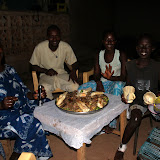
Mali, the largest country in West Africa, is bordered by seven other states: Algeria lies to the north and northeast, Niger to the east, Burkina Faso to the southeast and the Ivory Coast, to the south. To the west are Senegal and Mauritania. We flew into Dakar, Senegal and spent a few days there. After exploring Dakar and visiting Gorée Island and the city markets we hired a driver to take us across Senegal. These photos are from our visit to Gorée Island.


 It took a day and a half to make it to the border of Mali. We crossed the Falemé river from Senegal to Mali in a small dug out wooden boat.
It took a day and a half to make it to the border of Mali. We crossed the Falemé river from Senegal to Mali in a small dug out wooden boat.  Although Mali is today one of the poorest countries in the world it is known as a jewel in the crown of West Africa; it is culturally and historically rich, but economically poor. We were warmly welcomed, but I was surprised by the "Third World" infrastructure and conditions in the smaller towns.
Although Mali is today one of the poorest countries in the world it is known as a jewel in the crown of West Africa; it is culturally and historically rich, but economically poor. We were warmly welcomed, but I was surprised by the "Third World" infrastructure and conditions in the smaller towns.Our introduction to the people of Kenieba started with Billy’s host family. They were amazing. Doh, Billy’s host father works at the gold mine and comes home every few weeks. We were able to visit him in the village at the mine.

Tenin, Billy’s host sister, was very gracious and particularly enjoyed watching Bill try to eat with his hands. Mariam, best friends of Billy’s host family, is the mother figure who cooks and provides a stable home. Her son Levieux is a precocious and adorable four year old who loves to play the drum and smile. Here is a picture of Zak, Tenin and Levieux on the front porch of their house.
 Unfortunately Billy’s host mom died in childbirth just weeks before we arrived. We were very sad that we did not get the chance to meet her; Billy could not say enough wonderful things about her. Billy’s PCV house is next door to his host family’s home. It is much larger than I thought it was going to be and he seems to have what he needs to live.
Unfortunately Billy’s host mom died in childbirth just weeks before we arrived. We were very sad that we did not get the chance to meet her; Billy could not say enough wonderful things about her. Billy’s PCV house is next door to his host family’s home. It is much larger than I thought it was going to be and he seems to have what he needs to live. There are no toilets or running water. His African toilet (the photo above) is a hole in the ground with two cinderblocks and his “shower” is a bucket with water that he has heated on his gas burner and a cup to throw the water over his head. He does have a satellite dish that the Peace Corps installed a few weeks ago. I call it ET, so he can phone home.
There are no toilets or running water. His African toilet (the photo above) is a hole in the ground with two cinderblocks and his “shower” is a bucket with water that he has heated on his gas burner and a cup to throw the water over his head. He does have a satellite dish that the Peace Corps installed a few weeks ago. I call it ET, so he can phone home.To me, the best adjective that describes Kenieba is colorful. It was one of the most colorful places I have ever visited, full of wonderful people, great varieties of cultures and languages, and strong traditions of art and music. The streets are filled with people in shimmering embroidered colorful garments. The flowing robes or grand boubou of the men and the long wraparound skirt or boubou and matching headscarf of the women make quite an impression. Most women carry things on their head and a baby on their back. The babies are carried piggyback style then wrapped in a cloth that is pulled around their mother’s body and knotted around her front. It creates a snug sling like seat for the child. From the front you can only see the child’s feet sticking out from its mothers sides.


 We found music everywhere we went in Mali. The Sikoloton Shea Butter cooperative that Billy is working with gave us a festival with hours of singing, dancing, and playing traditional instruments. The women and the school children danced to the drummer’s music in their beautiful colored outfits. It was a site to behold. As with most celebrations some animal must give if its life, it was a sheep in this case. The sheep was presented to us as a gift and then taken, slaughtered and cooked for our lunch.
We found music everywhere we went in Mali. The Sikoloton Shea Butter cooperative that Billy is working with gave us a festival with hours of singing, dancing, and playing traditional instruments. The women and the school children danced to the drummer’s music in their beautiful colored outfits. It was a site to behold. As with most celebrations some animal must give if its life, it was a sheep in this case. The sheep was presented to us as a gift and then taken, slaughtered and cooked for our lunch.
























